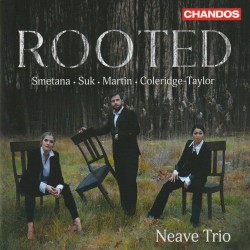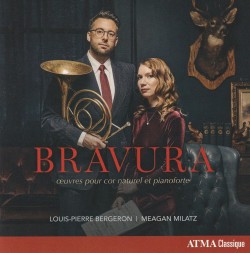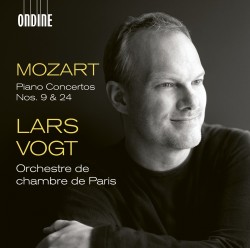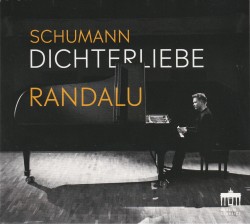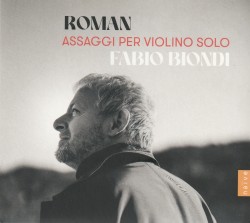 Fabio Biondi is the violinist on the naïve release Roman: Assaggi per Violino Solo, the unaccompanied works of the Swedish composer Johan Helmich Roman (prestomusic.com/classical/products/9614673--roman-assaggi-per-violino-solo).
Fabio Biondi is the violinist on the naïve release Roman: Assaggi per Violino Solo, the unaccompanied works of the Swedish composer Johan Helmich Roman (prestomusic.com/classical/products/9614673--roman-assaggi-per-violino-solo).
Composed mainly in the 1730s, the works have a complicated source situation. Proofs of two movements of the G Minor Assaggio BeRI 314 from an aborted 1740 publication project exist, with a comprehensive but incompletely preserved manuscript collection by Roman’s colleague Per Brant containing about 20 compositions – some only fragmentary – supplemented with several Roman autographs.
The CD booklet doesn’t identify which performing source or edition Bondi uses. Although he adds bass and harmony notes and occasionally embellishes repeats, he essentially follows the 1958 Stockholm edition published by Almqvist & Wiksell, its exhaustive Introduction detailing source notational differences and their implications for performance. All six Assaggi from that edition are here, along with the D Minor Assaggio BeRI 311 in beautifully animated and effortless performances of works that, like the Telemann Fantasies they resemble, often look deceptively easy on the printed page.
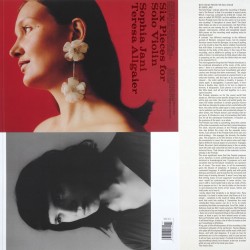 The contemporary German composer Sophia Jani wrote her Six Pieces for Solo Violin between 2020 and 2023; they are performed on a new Squama Recordings CD by Jani’s long-time collaborator violinist Teresa Allgaier (sophiajani.bandcamp.com).
The contemporary German composer Sophia Jani wrote her Six Pieces for Solo Violin between 2020 and 2023; they are performed on a new Squama Recordings CD by Jani’s long-time collaborator violinist Teresa Allgaier (sophiajani.bandcamp.com).
There are actually seven tracks on the disc, the slow, quiet Prelude acting as a separate introduction displaying elements – double stops, tremolo, arpeggios, etc. – that feature in the six diverse movements: Scordatura; Arpeggio; Triads; Capriccio; Grandezza; and Ricochet. The booklet notes describe the music as employing a mostly consonant language, unfolding gently and with great delicacy and leisure. The intensely effective build-up throughout the Arpeggio movement, the longest at eight minutes, might belie that, but only the Grandezza hints at any extended technique.
Allgaier is outstanding in what must be regarded as a definitive performance of a work that is a significant addition to the solo violin repertoire.
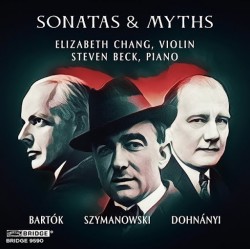 Violinist Elizabeth Chang describes the early 20th-century works on the new Bridge CD Sonatas & Myths as being by composers at the end of the Romantic period attempting to integrate their Germanic-based schooling with the emergence of new influences and styles. Steven Beck is the excellent accompanist (bridgerecords.com/products/9590).
Violinist Elizabeth Chang describes the early 20th-century works on the new Bridge CD Sonatas & Myths as being by composers at the end of the Romantic period attempting to integrate their Germanic-based schooling with the emergence of new influences and styles. Steven Beck is the excellent accompanist (bridgerecords.com/products/9590).
Karol Szymanowski’s French-influenced Mythes: Trois Poèmes, Op.30 from 1915 opens the disc, with Chang’s bright, clear tone soaring through the mostly very high register writing. Ernst von Dohnányi, on the other hand, for the most part remained in the Romantic style of Brahms and Richard Strauss, his impressive Violin Sonata in C-sharp Minor, Op.21 from 1912 mostly looking backwards rather than forwards, although clearly showing the influence of Hungarian folk music in the second movement.
That folk music influence was even greater for Béla Bartók, who collected and studied Eastern-European folk music while also being influenced by contemporary composers like Schoenberg and Stravinsky. His Violin Sonata No.1 from 1921, though, is a complex work with less folk influence than you might expect.
Chang and Beck are in great form throughout an impressive recital.
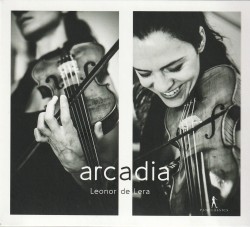 On the PAN CLASSICS disc Arcadia baroque violinist and artistic director Leonor de Lera is joined by Nacho Laguna on theorbo and baroque guitar and Pablo FitzGerald on archlute and baroque guitar in a quite superb recital of predominantly 16th-century music inspired by the pastoral poetry of the Arcadian world (leonordelera.com).
On the PAN CLASSICS disc Arcadia baroque violinist and artistic director Leonor de Lera is joined by Nacho Laguna on theorbo and baroque guitar and Pablo FitzGerald on archlute and baroque guitar in a quite superb recital of predominantly 16th-century music inspired by the pastoral poetry of the Arcadian world (leonordelera.com).
Composers represented are Claudio Monteverdi, Andrea Falconieri, Philippe Verdelot, Bartolomeo Tromboncino, Adrian Willaert, Vincenzo Ruffo, Giammatteo Asola, Giaches de Wert, Giuseppino del Biado, Riccardo Rognoni, Giulio Caccini, Francesco Rognoni and Sigismondo d’India.
Lera’s use of diminutions – the ornamentation style and practice of Renaissance and Early Baroque Italian music in which long-value notes are broken down into shorter and more rapid notes that move around the melody – results in dazzling performances that simply burst with life, superbly supported by the lutes and guitars and beautifully recorded.
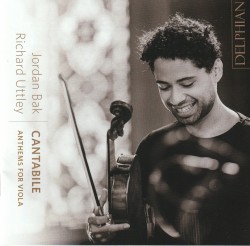 Cantabile: Anthems for Viola, the first album on the Delphian label by the Jamaican-American violist Jordan Bak is a recital built around two substantial 20th-century English works. Richard Uttley is the accompanist (delphianrecords.com/products/cantabile-anthems-for-viola).
Cantabile: Anthems for Viola, the first album on the Delphian label by the Jamaican-American violist Jordan Bak is a recital built around two substantial 20th-century English works. Richard Uttley is the accompanist (delphianrecords.com/products/cantabile-anthems-for-viola).
The brief and somewhat discordant Chant by English composer Jonathan Harvey provides a subdued opening before Vaughan Williams’ lovely Romance, only discovered after the composer’s death in 1958, and Bright Sheng’s solo viola work The Stream Flows.
The two major works, separated by the premiere recording of Augusta Read Thomas’ Song without Words are the Bax Sonata for Viola and Piano, GP251, written in 1922 for Lionel Tertis and the Britten Lachrymae: Reflections on a Song of Dowland, Op.48, written for William Primrose in 1950. The Bax in particular is a gorgeous work, given a superb performance that is worth the price of this outstanding CD on its own.
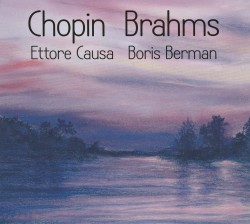 In his excellent booklet essay for the new Le Palais des Dégustateurs recording Chopin Brahms CD featuring violist Ettore Causa and pianist Boris Berman (lepalaisdesdegustateurs.com) Paul Berry suggests that by ignoring arrangements and transcriptions in favour of precisely executed original works modern practice inadvertently eliminates an essential element of reimagination.
In his excellent booklet essay for the new Le Palais des Dégustateurs recording Chopin Brahms CD featuring violist Ettore Causa and pianist Boris Berman (lepalaisdesdegustateurs.com) Paul Berry suggests that by ignoring arrangements and transcriptions in favour of precisely executed original works modern practice inadvertently eliminates an essential element of reimagination.
Successful transcriptions need no justification, though, and that’s clearly the case here with the performers’ own beautiful transcriptions of Chopin’s Cello Sonata in G Minor, Op.65 and Brahms’ Violin Sonata in G Major, Op.78. The keyboard parts remain virtually unchanged, with the viola’s adjustments up or down an octave to compensate for the cello’s lowest compass and the violin’s highest register respectively resulting in both pieces being imbued with what Berry calls “an unfamiliar delicacy.”
While some strength and depth are consequently lost in the Chopin, the opposite is true in the Brahms, the viola’s broader and warmer tone seemingly adding to the emotional effect.
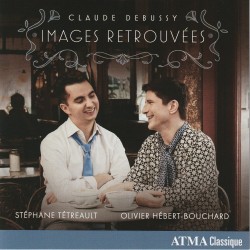 ATMA Classique’s Images Retrouvées is the second issue in the Images Oubliées project by cellist Stéphane Tétrault and pianist Olivier Hébert-Bouchard that focuses on the genius of Claude Debussy (atmaclassique.com/en).
ATMA Classique’s Images Retrouvées is the second issue in the Images Oubliées project by cellist Stéphane Tétrault and pianist Olivier Hébert-Bouchard that focuses on the genius of Claude Debussy (atmaclassique.com/en).
The performers cite Debussy’s interest in transcription – creating piano reductions of his own orchestral works and entrusting the orchestration of his piano works to colleagues – as the spur for their desire to create and reinvent; their arrangements for cello and piano of pieces predominantly for piano solo, give the music a new range of tone colours.
The 15 tracks are arranged chronologically, and include Deux arabesques, D’un cahier d’esquisses, L’isle joyeuse and Golliwog’s Cakewalk. Tétrault plays with a warm, even tone across the cello’s entire range, sensitively accompanied by Hébert-Bouchard in a recital of few dynamic peaks. In truth, it’s much of a muchness, but when the “muchness” is presented so beautifully, who can object?
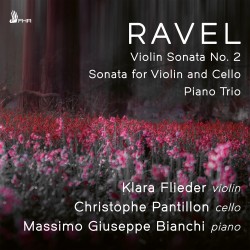 Works involving violin, cello and piano are presented on the new First Hand Records CD Ravel featuring violinist Klara Flieder, cellist Christophe Pantillon and pianist Massimo Giuseppe Bianchi (firsthandrecords.com).
Works involving violin, cello and piano are presented on the new First Hand Records CD Ravel featuring violinist Klara Flieder, cellist Christophe Pantillon and pianist Massimo Giuseppe Bianchi (firsthandrecords.com).
Ravel’s Violin Sonata No.2 in G Major, M77 was written between 1923 and 1927, and has a second movement with a decidedly bluesy nature. His Sonata in A Minor for Violin and Cello, M73 from 1920-22 was dedicated to Debussy, who had died in 1918, and references his music along with a Hungarian influence which may well have been provided by Kodály’s 1914 sonata for the same instruments. The Piano Trio in A Minor, M67 from 1914 completes the disc.
There’s plenty of fine playing here, although the violin seems to be set back a bit in the two works with piano, with the latter particularly prominent in the Trio.
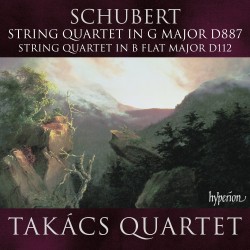 Any CD by the superb Takács Quartet is always guaranteed to provide performances of the highest quality, and this is proven again with their new Hyperion CD of quartets from each end of the composer’s life on Schubert String Quartets D112 & D887 (hyperion-records.co.uk/dc.asp?dc=D_CDA68423).
Any CD by the superb Takács Quartet is always guaranteed to provide performances of the highest quality, and this is proven again with their new Hyperion CD of quartets from each end of the composer’s life on Schubert String Quartets D112 & D887 (hyperion-records.co.uk/dc.asp?dc=D_CDA68423).
The String Quartet No.15 in G Major, D887 from June of 1826 was the last quartet Schubert wrote, not being published until 1851, 23 years after his death. Described here as being one of the composer’s most ambitious and far-reaching chamber works, its extremely challenging technical difficulties and emotional turbulence have tended to restrict its performances. Not that you would guess that for a moment, given the deep and richly-nuanced performance here.
The String Quartet No.8 in B-flat Major, D112 was written in 1814 when Schubert was only 17 and clearly shows the influence of Haydn and Mozart. Again, the Takács players are outstanding on another terrific CD to add to their already impressive discography.
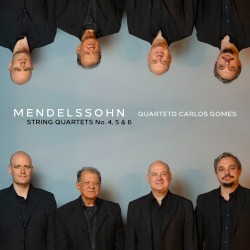 Mendelssohn String Quartets Nos. 4, 5 & 6 is the second volume in the series by Brazil’s Quarteto Carlos Gomes on the Azul label (azulmusic.com.br/en).
Mendelssohn String Quartets Nos. 4, 5 & 6 is the second volume in the series by Brazil’s Quarteto Carlos Gomes on the Azul label (azulmusic.com.br/en).
The works are the last three quartets that Mendelssohn wrote: No.4 in E Minor, Op.44 No.2 from 1837, revised in 1839; No.5 in E-flat, Op.44 No.3 from 1837-38; and No.6 in F Minor, Op.80 from 1847, the last major work that he completed. The latter in particular is an intensely personal work, written in a period of mourning following the death of his sister Fannie in May, and only two months before his own death in November.
Strong performances, full-bodied, warm, full of feeling and resonantly recorded, more than hold their own in a highly competitive field.
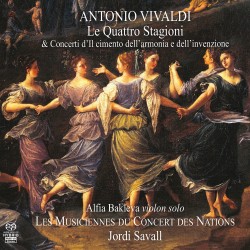 There’s yet another terrific recording of the Four Seasons on Antonio Vivaldi: Le Quattro Stagioni, a 2CD issue priced as a single disc with Jordi Savall directing soloist Alfia Bakieva and the all-female Les Musiciennes du Concert des Nations, which takes its inspiration from Vivaldi’s girls’ orchestra at the Ospedale della Pietá in Venice (alia-vox.com/en/producte/antonio-vivaldi-le-quattro-stagion).
There’s yet another terrific recording of the Four Seasons on Antonio Vivaldi: Le Quattro Stagioni, a 2CD issue priced as a single disc with Jordi Savall directing soloist Alfia Bakieva and the all-female Les Musiciennes du Concert des Nations, which takes its inspiration from Vivaldi’s girls’ orchestra at the Ospedale della Pietá in Venice (alia-vox.com/en/producte/antonio-vivaldi-le-quattro-stagion).
There are in fact two recordings of the work here, with and without the sonnets that are written in the score: CD1 opens with the sonnets read in Italian (full translations in the booklet) and CD2 closes with the music-only performance.
The other works on CD1 are the Concerto in F Major, Il Proteo o sia il mondo al rovescio, RV544 and the Concerto in E-flat Major, La Tempesta di mare, RV253. CD2 opens with the L’Estro armonico, Op.3, Concerto No.10 in B Minor, RV580, and the second movement Andante from the Concerto in B-flat Major, RV583. All performances are beautifully judged throughout this outstanding release.
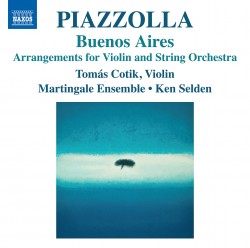 On PIAZZOLLA: Buenos Aires violinist Tomás Cotik pays homage to his birth city with his third Piazzolla CD for Naxos, accompanied by the Martingale Ensemble under Ken Seldon (tomascotik.com).
On PIAZZOLLA: Buenos Aires violinist Tomás Cotik pays homage to his birth city with his third Piazzolla CD for Naxos, accompanied by the Martingale Ensemble under Ken Seldon (tomascotik.com).
The central work on the CD is the now familiar Leonid Desyatnikov concerto arrangement of Las cuatro estaciones porteñas (“The Four Seasons of Buenos Aires”), the four movements of which were written in 1961 and 1969 and originally conceived as individual compositions rather than a single suite. Desyatnikov’s arrangement incorporates quotes from the Vivaldi work. The remaining seven pieces are all 2021 arrangements by Ken Seldon of pieces that Piazzolla wrote for his Quinteto Nuevo Tango: Chin, Chin; Ressurreción del Ángel; Mumuki; Soledad; Zita; Celos; and Fugata. Transcribed from printed sources but incorporating improvisations from original Piazzolla recordings, they work brilliantly.
Cotik, as usual, is in his element here on a CD of just over an hour of gorgeous playing of captivating music.
 Yuri Zhislin is the outstanding violin and viola soloist on BARTÓK, an Orchid Classics CD featuring one early and one late concerto that were both premiered after the composer’s death. Valery Poliansky conducts the State Symphony Capella of Russia (orchidclassics.com/releases/orc100304-bartok).
Yuri Zhislin is the outstanding violin and viola soloist on BARTÓK, an Orchid Classics CD featuring one early and one late concerto that were both premiered after the composer’s death. Valery Poliansky conducts the State Symphony Capella of Russia (orchidclassics.com/releases/orc100304-bartok).
Bartók had moved to the USA in 1940, and by late1944 was in failing health and poor financial straits. William Primrose commissioned a viola work from him, and by early September 1945 Bartók reported that a concerto was “ready in draft . . . only the score has to be written.” He died on September 26 with the work unorchestrated, leaving piles of un-numbered pages and scraps of paper with corrections and revisions. Tibor Serly undertook the enormous task of shaping and orchestrating the concerto, which was premiered by Primrose in December 1949, Primrose feeling that the finished work was “very, very close” to what Bartók intended. The work was revised by the composer’s son Peter and violist Paul Neubauer in 1995, with that edition now foremost.
The Violin Concerto No.1 was written in 1907-08 for the young violinist Stefi Geyer, with whom Bartók was in love; his feelings were not reciprocated, however, and she rejected the concerto. He presented Geyer with the manuscript, but it was not published until 1958 after both principals had died. The first of the two movements is rhapsodic and simply gorgeous.
Zhislin’s own arrangement for violin and string orchestra of the Six Romanian Folk Dances from 1915 completes a disc full of superb playing by all concerned.
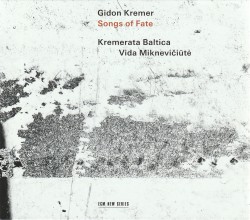 On the ECM New Series release Songs of Fate violinist Gidon Kremer, along with his Kremerata Baltica and soprano Vida Miknevičiūtė, presents works by three contemporary Baltic composers and by Mieczysław Weinberg. Many of them are premiere recordings in a programme that has its roots in Kremer’s Jewish heritage and his personal ties to the Baltic states (ecmrecords.com/product/songs-of-fate-gidon-kremer-kremerata-baltica-vida-mikneviciute).
On the ECM New Series release Songs of Fate violinist Gidon Kremer, along with his Kremerata Baltica and soprano Vida Miknevičiūtė, presents works by three contemporary Baltic composers and by Mieczysław Weinberg. Many of them are premiere recordings in a programme that has its roots in Kremer’s Jewish heritage and his personal ties to the Baltic states (ecmrecords.com/product/songs-of-fate-gidon-kremer-kremerata-baltica-vida-mikneviciute).
This too shall pass, a recent work for violin, cello, vibraphone and strings by Raminta Šerkšnytė (b.1975) opens the disc. Giedrius Kuprevičius (b.1944) is represented by David’s Lamentation for soprano and orchestra and Postlude: The Luminous Lament for soprano and violin, both from 2018’s Chamber Symphony “The Star of David” and by Kaddish-Prelude for violin and percussion and Penultimate Kaddish for soprano and orchestra.
The Weinberg pieces – Nocturne for violin and strings (1948/49), Aria, Op.9 for string quartet (1942), Kujawiak for violin and orchestra (1952) and three excerpts from Jewish Songs, Op.13 for soprano and strings (1943) – are strongly tonal and quite lovely.
Lignum (2017) for string orchestra and wind chimes by Jēkabs Jančevskis (b.1992) provides a gentle ending to an immensely satisfying CD.
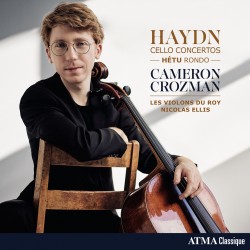 Haydn: Cello Concertos and Hétu: Rondo is the latest ATMA Classique CD from Canadian cellist Cameron Crozman, with Nicolas Ellis leading Les Violons du Roy (atmaclassique.com/en).
Haydn: Cello Concertos and Hétu: Rondo is the latest ATMA Classique CD from Canadian cellist Cameron Crozman, with Nicolas Ellis leading Les Violons du Roy (atmaclassique.com/en).
Haydn’s Cello Concerto No.1 in C Major was written in the early 1760s and presumed lost for 200 years before a copy of the score was discovered in the National Museum in Prague in 1961. The Cello Concerto No.2 in D Major, conversely, was not lost but believed to have been written by Anton Kraft before the 1951 discovery of a Haydn autograph manuscript. The warmth and grace of Crozman’s playing make for delightful performances, with idiomatic support from Les Violons du Roy that features some particularly nice continuo touches.
Jacques Hétu’s brief but animated Rondo for Cello and String Orchestra Op.9 was written in 1965, when the composer was 27 years old; this is its world premiere recording.
With this impressive and highly enjoyable release Crozman continues to establish himself as simply one of the finest young cellists around.
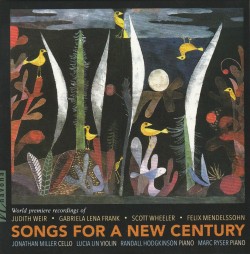 Songs for a New Century
Songs for a New Century

